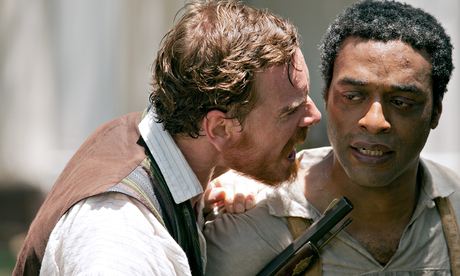
No DVD release this year arrives on shelves more pre-gilded than 12 Years a Slave (Entertainment One, 15), the darling of the last Oscar season – though the rare one, its most ardent champions insist, that is actually for life, not just for Christmas. Since appearing on the festival circuit last autumn, Steve McQueen's solemnly poetic realisation of freeman-turned-slave Solomon Northup's memoir has been lavished with praise that, however deserved, has bordered on the prescriptive: Amy Poehler's priceless Golden Globes quip that she'd "never look at slavery the same way again" was a cheeky rejoinder to publicity that sold the film more on its Important Issues than its tender, tactile humanity.
As corporeally fixated as McQueen's previous features, Hunger and Shame, 12 Years a Slave takes as given our awareness of slavery and its horrors, but not its specificities. Rather like Schindler's List before it, it's a film that gives sensual life to atrocities that are easier to process on paper; the anger and sheer exhaustion written across Northup's face, as stoically worn by Chiwetel Ejiofor, is no less vivid than the warped emotional motivations of Michael Fassbender's lusting, unhinged slavemaster. "Brutality" was a go-to word for critics, but on a second viewing, it's serenity – of release, of resistance, of understanding – that comes to the fore of a film I still find easier to admire than to adore.
No such conflicts or challenges in The Trip to Italy (BBC, 15). Serving up the simple pleasures of landscapes, gastroporn and the odd-couple banter of Rob Brydon and Steve Coogan to rollicking effect, the series follows the same unscripted format of 2010's The Trip – though both the scenery and the cuisine get a sizable upgrade from that endeavour's north of England route. Released in the US as a single edited film, it seems more at home on TV.
The same might be said for Veronica Mars (Warner, 12), an enthusiastic, Kickstarter-funded cinematic extension of the unceremoniously cancelled (but evidently much-loved) US detective series, in which Kristen Bell's charismatic gumshoe – a sort of street-smart Nancy Drew figure – is a little slight for the big screen.
The Paranormal Activity horror franchise, meanwhile, feels positively televisual in its regularity (five films in six years) and reliability: the shock tactics are unchanged in Paranormal Activity: The Marked Ones (Paramount, 15). The found-footage goings-on are refreshingly relocated to a Latin-dominated urban setting, but they remain effective.
Reaching for the Moon (Peccadillo, 15) is a dramatically muted but beautifully performed study of the romance between American poet Elizabeth Bishop (Miranda Otto) and Brazilian architect Lota de Macedo Soares (Glória Pires). Its bright take on female sexuality is shared by the otherwise very dissimilar Afternoon Delight (House, 15), an uneven but briskly funny farce about a stay-at-home mum's stripper-assisted liberation, which has drawn some oddly vicious reviews. Surely everyone, at least, can welcome a racy, rounded lead role for the perpetually underused Kathryn Hahn.
There are dappled shades of Joanna Hogg, with less formal determination, in elegiac British ensemble drama Back to the Garden (Drakes Avenue, 12), in which a group of theatrical colleagues gather for their late mentor's memorial party. A peppier but minor diversion is Ginga (Mr Bongo, E), a Brazilian football documentary from 2005 belatedly but cannily making its way to DVD in time for the World Cup.
Amid a rum bunch of recent additions to the Netflix library, the critically massacred two-part film adaptation of Ayn Rand's Atlas Shrugged is available to the brave and curious, after unsurprisingly skipping UK cinemas. A better bet, perhaps, is Down Terrace, the under-seen 2009 debut feature of Ben Wheatley – a fierce, black-hearted British genre craftsman who has since won a sizable following with Kill List and Sightseers, but hasn't yet made a more complete film than this grimly hilarious family portrait of a Brighton criminal clan.

